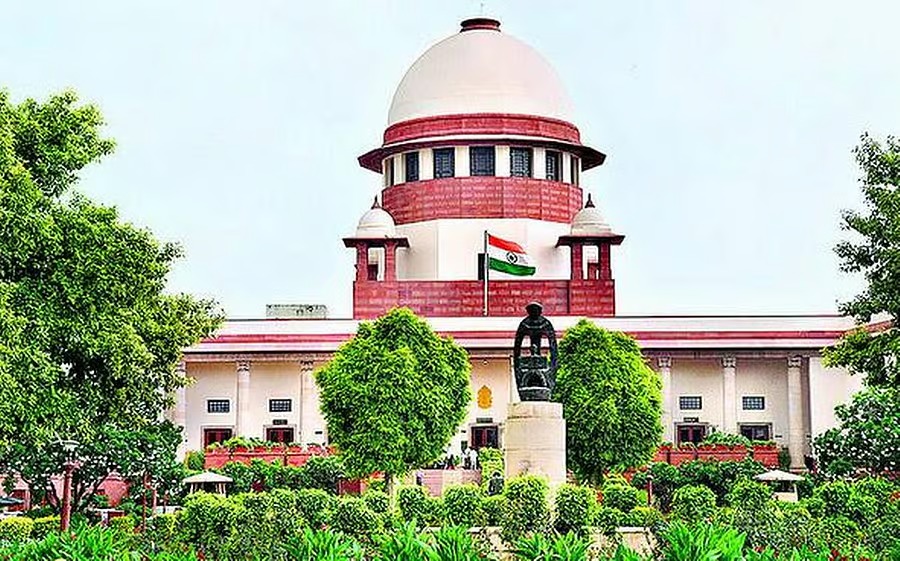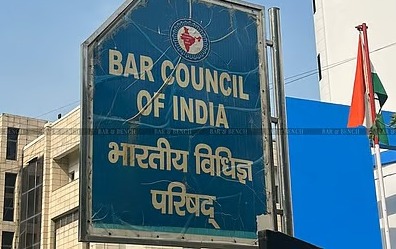Banerjee, J.@mdashThis appeal at the instance of the Bank of India arose out of a suit of eviction filed by the landlord against the Bank. It appears that the plaintiffs are trustees of the Trust, styled as "Nathi Bai Binani Trust" and the premises No. 59, Cotton Street, Calcutta belongs to the said Trust. By a registered deed of lease dated 1st November, 1958, the aforesaid Trust, through its trustees, granted lease to the defendant in respect of the entire first floor of the premises No. 59, Cotton Street, Calcutta, including a separate staircase and one kitchen room on the ground floor of the said premises for a period of 16 years commencing from the first day of September 1958, and, terminating on 31st day of August, 1974, with an option to the lessee to extend the same thereafter for a period of 3 years at a monthly rent of Rs. 1200/- since mutually increased to Rs. 1320/for the facility of installing air conditioned unit payable according to English Calendar month. One of the said terms of the lease was that:
3(b). That the defendant shall at the expiration or sooner determination of the terms hereby granted peacefully and quietly yield and deliver up to the plaintiffs vacant possession of the demised premises and the said kitchen room in the ground floor in as good condition as the same now are with structural additions and constructions as aforesaid in reasonable wear and tear and damage by fire or other act of God or by any kind of irresistible force always excepted.
In pursuance of the terms of the lease, the defendant was continuing in possession of the premises and the plaintiffs were accepting rent from the defendant. After the expiry of the original period of the said lease on 31st August, 1974, the defendant exercised the option contained in the lease which was after some demur accepted to by the plaintiffs and the defendant continued in possession of the premises in the same terms and conditions till the 31st August, 1977, when the said extended period expired. It appears that the defendant, Bank of India, did not vacate the premises after the expiry of 31st August, 1977 whereupon the plaintiffs by letter dated 8th August, 1977 asked the defendant. Bank of India to vacate the premises by 31st August, 1977. The defendant Bank having refused to do so, the instant suit was filed. The defendant Bank entered appearance and filed written statement, inter alia, alleging that the defendant was originally inducted, to the tenancy in suit on 1.9.58, by the plaintiff No. 1 and thereafter a registered deed was executed on 1.11.58, between Nathi Bai Binani Trust Estate as Lessors and the defendant as Lessee. It is admitted that in the lease there was a covenant for option of renewal of the lease by this defendant for further period of 3 years on fulfillment of certain terms by the Bank. On the expiry of the Lease period of 16 years, there was no renewal of the lease nor any lease deed for any further period was executed and it is alleged that the defendant became monthly tenant under the plaintiff No. 1 and the said Bhowanidas Binani as trustees of the said Trust Estate on and from 1.9.74, and the tenancy was governed by the West Bengal Premises Tenancy Act, 1956.
2. Before we deal with the question raised in this appeal, it is convenient for us to refer to some of the documents which are exhibited in the suit. Exhibit "1" is a Deed of Lease registered on 1st November, 1958, in favour of the Bank of India for 16 years. It appears that during the subsistence of the lease, the Bank of India wanted to install Air-condition machine in the premises and by agreement by both the parties for the added advantage, the rent was enhanced from Rs. 1200/- to 1320/-. Be that as it may, under the stipulation of the renewal clause, it was provided that the option for renewal must be-exercised, one year before the expiry of the term of the lease.
3. By letter dated 2nd April, 1974, the Agent of the Bank of India wrote to the Trustees of Nathi Bai Binani Trust (Ext. 12) to say that the period of lease fixed for 16 years terminates on 31. 8. 74 and that the deed also contains an express provision of extension for further term of 3 years commencing from 1.9.74. It is further stated that in view of the above terms, steps are being taken by the Bank of India Authorities for extension of the terms of lease and the Bank solicited co-operation in having the necessary papers duly executed as lessors and lessee in due course of time. On 23rd August, 1974, the Bank of India again (Ext. 13) wrote and sent a copy of the draft lease for renewal of the lease for a further period of 3 years from 1st September, 1974 to 31st August, 1977, and asked to return the draft lease endorsing the approval of the trustees so that the lease deed can be executed by 31st August, 1974. On 13th September, 1974, Nathi Bai Binani Trust, the plaintiffs, did not grant the extension and returned the draft lease agreement without any permission. It appears however subsequently that the plaintiffs agreed to extend the period of lease under the renewal clause (Ext. 18) as a special case the delay committed by the Bank was condoned and the plaintiffs asked the Agent of the Bank of India to forward the draft for the purpose. By letter dated 18th February, 1976, (Ext. 19) the Bank of India accepted the condition for extension and sent the draft of the lease for approval. On 17th March, 1976, (Ext. 20) the landlords-plaintiffs approved the draft lease. Soon thereafter on 22nd April, 1976, (Ext. 21) the defendant-appellant wrote as follows :-
We acknowledge the receipt of your letter dated 17.3.1976 approving the draft lease for extension of lease deed dated 1.11.1958 for further three years from 1. 9. 1974 in respect of captioned premises.
2. While we thank you for the approval we state that we will be needing the above-mentioned premises for the Bank''s business even after expiry of extended lease term. Therefore, we think we should proceed right now for a fresh lease on long term basis. Please send us your offer in this respect keeping in view our long and very good relation with you.
3. This has also reference to the discussion made with your representative Mr. Daga time to time.
On 14th May, 1976 (Ext. 22) the Bank of India wrote to ask for offer from the plaintiffs for a fresh lease for a long term basis as the Bank will be needing even after the expiry of the extended lease term. After a long correspondence the Bank of India through their Solicitor stated for the first time that the defendant is a statutory tenant in respect of the premises in question under the West Bengal Premises Tenancy Act, 1956. On this basis the parties went on trial. The learned Judge, City Civil Court, held against the Bank. Hence the appeal by the defendent Bank of India, before us.
4. Mr. B.C. Dutton behalf of the appellant contended firstly that the exercise of the option is not a valid one. Secondly, it is argued that if the option is to be exercised for more than 1 year, as in this case for 3 years, as there is no registered lease, the Bank becomes a statutory tenant under the West Bengal Premises Tenancy Act. It is argued that this term after the expiry of 16 years and as no registered deed of lease was executed, the Bank of India became a tenant under the West Bengal premises Tenancy Act. Alternatively Mr. Dutt argued that even if there is a lease, it is a lease for 3 years having come into existence when the West Bengal Premises Tenancy Act continued in force still the Premises Tenancy Act in terms applies and no ejectment decree can be obtained by the respondent. The first question before us is whether the tenancy is to be governed by the West Bengal Premises Tenancy Act. In our opinion, in view of section 3 of the West Bengal Premises Tenancy Act, it does not apply to the lease executed before 1965 for more than 16 years and therefore on the face of it the argument of Mr. Dutt on that score is not tenable. On this question, there are two Division Bench decisions of this Court, namely, Krishna Prasad v. Saraju 65 CWN 293 and
5. We will refer to the decision reported in
6. In the case reported in
7. Both Mr. Dutt and Mr. Mukherjee relied upon the case reported in
8. Mr. Dutt contended that as no lease was executed and registered after the expiry of the 16 years period and the option of 3 years though exercised but nor registered and the landlord accepted the rent fresh lease is created. Mr. Dutt relied upon the cases reported in
9. Mr. Dutt contended that as there was no renewal after the expiry of the lease and subsequently the renewal was for a period of 3 years, the registration is required. There is no doubt that the lease for more than 1 year requires registration but in the facts and circumstances of the case it appears on the face of it that the lessee applied under the renewal clause under a registered lease for 16 years for renewal of 3 years. It appears further that under the renewal clause the lessee was given one year''s notice for renewal of the lease to the lessor. The lessor at the first instance was not inclined to grant the renewal but subsequently accepted the term of the renewal and sent the draft of fresh lease for registration which was not registed by the lessee deliberately.
10. Mr. Banerjee rightly pointed out with reference to page 83 of Part-II of the Paper Book that in the letter dated 26/27th August, 1977 it is stated that after the expiry of the term of lease including the extended period the tenant does not becomes statutory tenant. From the letter dated 8th August, 1977, addressed to the Agent, Bank of India and his reply dated 26/27th August, 1977, it will be clear that the defendant was holding out the terms of the lease after the expiry of the 3 years of the lease under the renewal clause. It must be stated that the acceptance of rent by the landlord was only after the landlord has waived the period of notice. Exts. 18 and 19 reading together it is clear that the tenant accepted the extension of the lease terms and the lessor condoned the delay in giving the notice. A person who is entitled to the notice under a contract can certainly waive such notice that is exactly what has been done in the present case.
11. Mr. Dutt relied upon the cases reported in
12. The case reported in
13. In the circumstances stated hereinbefore, in our opinion, there is no merit in this appeal.
The appeal is, therefore, dismissed with costs.
14. Oral leave was prayed for by the learned Advocate for the appellant under Article 134(a) read with Article 133(i)(a) and (b) of the Constitution of India. But we are of opinion that the question raised does not fall within the purview of Article (a) and (b). of the Constitution. Leave is therefore refused.
The prayer for stay of operation of this order is also refused.
Sharma, J.
I agree.

